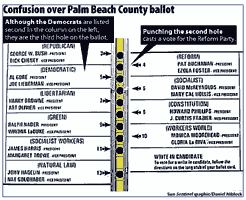| October 2002 IBEW
Journal
Voting Reform Legislation
Languishes in Congress
The presidential election of
2000 revealed a variety of voting problems that, according
to the Caltech/MIT Voting Technology Project, disenfranchised
an estimated four to six million Americans. People who were
registered could not vote because of purged or mistaken lists
of registered voters. Some, primarily in poorer communities,
were discouraged from voting because a large police presence
intimidated them.
Voters inadvertently voted for
the wrong candidate because of the complexity of the ballot.
Many votes were not counted because of flaws in voting technologies,
such as hanging chads and misaligned machines. Whole ballot
boxes were misplaced or lost. Many registered voters gave
up, discouraged by the long lines or broken machines.

Sample of a butterfly ballot. |
In his dissent to the U.S. Supreme
Court decision Bush v. Gore, which ended the count in Florida
and named George W. Bush the winner, Supreme Court Justice
John Paul Stevens observed, "Although we may never know
with complete certainty the identity of the winner of [the
2000] presidential election, the identity of the loser is
perfectly clear. It is the nations confidence in the judge
as an impartial guardian of the rule of law." The nation
learned how voting procedures across America can prevent voters
from having their say, and, in particular, that working families
of color, immigrant citizens and older Americans are disproportionately
disenfranchised by the failure of voting systems.
The Supreme Courts flawed decision
in Bush v. Gore nevertheless supported the principle that
differential treatment of voters violates the equal protection
clause of the Fourteenth Amendment. Fair application of that
principle would require many salutary changes in how votes
are cast and counted across the country.
Conducting elections has historically
been a state and local function. Comprehensive, national reform
can only be achieved through federal action. This action should
include providing financial support to states as they modernize
and standardize their voting systems.
Guiding Principles
for Election Reform
Several election reform task
forces have recommended various measures that could help ensure
fair and open elections. Many of those recommendations are
condensed into the following four "guiding principles."
First, voter registration
should be simple and easy, designed to encourage voting. We
should promote voter registration at age 18 and, for Election
Day, same-day registration and voting. Also, we need to establish
more uniform and effective systems to maintain and update
voter registration lists.
A major complaint about the Florida
election was that voters with voter identification cards went
to their assigned polling places and discovered their names
were not on the voter lists. In Jacksonville (Duval County),
the supervisor of elections admitted that "motor voter"
applications filled out in the last weeks of the registration
period had not been processed. Thousands of other eligible
voters appeared to have been purged at the last minute by
the secretary of states office using faulty lists.
The National Voter Registration
Act of 1993 ("Motor Voter Act") provided for national
standards for voter registration by mail, when applying for
a drivers license and at designated government agencies.
However, there are no penalties for noncompliance and no provisions
allowing people to vote after Election Day if their right
to vote was denied because of a violation of the act. No uniform
federal provisions govern identification requirements or the
right to a provisional vote if there is a question about a
voters eligibility. The experience of people of color trying
to vote in Florida but being excluded for various reasons
suggests a need for national registration standards. Any person
denied the right to vote because of a violation of the Motor
Voter Act standards should be permitted to vote if he or she
files a timely complaint, and there should be tough penalties
for violations of the Motor Voter Act.
Second, voting should be easy.
A few states have mail-in ballots
or provide for early voting. Otherwise, voting in national
elections is conducted during set hours on a workday, the
first Tuesday in November. The result is that the bulk of
the votes are cast during the first few and the last few hours
the polls are open. Limited polling hours are a problem for
working people, particularly those who work mandatory overtime
and, in some cases, have to work until after the polls close.
A more serious problem is the delay involved during the crush
of voters in the last few hours. Confronted by long lines
at the polls in the evening, many people choose not to vote
rather than neglect their families or jeopardize their jobs.
When voting-list irregularities
exist, limited voting hours lead to the effective collapse
of the system for assisting voters who have a problem trying
to vote. In some counties in Florida, voters with such problems
were told to go home and wait to be called back to vote when
the precinct workers could get through to the County Supervisor
of Elections office. Polling places in minority communities
in some states reported long lines due to a single list of
eligible voters, while other communities were equipped with
multiple copies.
Among the recommended solutions
are time off from work for voting (either a full-day holiday
or paid leave during the day), extended voting hours, multi-day
elections or weekend elections. Election Day in many democratic
countries falls on a weekend or is a holiday. In fact, Election
Day in the United States in the 19th century was
generally treated as a holiday much like the Fourth of July.
Obstacles in the voting process
itself should be removed. For example, voters should have
an absolute right to cast provisional ballots if their names
do not appear on the list at their designated polling place.
In addition, uniform and reasonable identification requirements
and procedures should be established and enforced equally.
Third, we must ensure that
every vote gets counted.
Voting should not be treated
as a series of traps where the role of election officials
is to disqualify those who make mistakes. Furthermore, we
need common procedures to safeguard ballots during the time
between the closing of the polls and the counting of the votes.
In Florida, out-of-date equipment,
confusing ballots and the failure of election officials to
provide adequate assistance led to tens of thousands of votes
not being counted. American citizens deserve guarantees that
in light of the imperfections of any given voting system,
election officials will have the opportunity to look at ballots
to determine voter intent. Since voters come to the polls
to vote, election officials should not look for reasons to
discard their ballots, but should ensure that they are able
to register their choices.
The experience in Florida and
other parts of the country demonstrated that some types of
voting systems are more likely than others to result in uncounted
ballots. In particular, punch-card machines are problem-prone
and must be replaced. Also, variations in ballot design and
in sample ballots and actual ballots led to tens of thousands
of voters in Florida being disenfranchised. Error-prone systems
were used primarily in poorer areas, and people of color and
senior citizens were less likely to have their ballots counted.
One solution to these problems
is a common ballot format in federal elections and a common
voting technology nationwide, with appropriate training for
poll workers. The reliable voting machines currently in use
in many affluent communities should be provided to voters
everywhere. Such changes should be phased in as quickly as
possible with federal financial assistance.
In addition, recount procedures
and timetables in federal elections should be specifically
described to avoid the chaos that ensued in Florida through
ill-defined recount procedures and deadlines for recounts.
Fourth, voting rights laws
should be aggressively enforced with penalties stiff enough
to act as a meaningful deterrent.
The federal Voting Rights Act
of 1965 prohibits the enactment of any election law that denies
or abridges the voting rights of minorities. To enforce this
prohibition, the act requires certain states with a history
of discriminatory voting practices to get clearance from the
U.S. Department of Justice for any proposed change in their
election laws or regulations. However, the Voting Rights Act
does not have provisions explicitly allowing retroactive relief
except in certain circumstances (where a federal monitor has
already been appointed).
Voting Reform Needed Now!
Congress must act now to ensure
that the wholesale disenfranchisement of voters in Florida
and elsewhere is never repeated. American citizens deserve
election reform that is anchored in basic principles fundamental
to any democracy chief among them that the right to vote
is guaranteed to all citizens and not a privilege reserved
just for the affluent.
Note: Several federal legislative
proposals addressing "election reform" incorporate
provisions on campaign finance reform. This article
mentions bills that deal primarily with proposals to reform
the election process itself and provide funding to the states
to help implement the relevant provisions.

|

